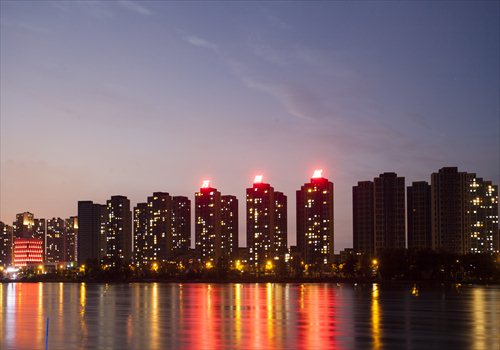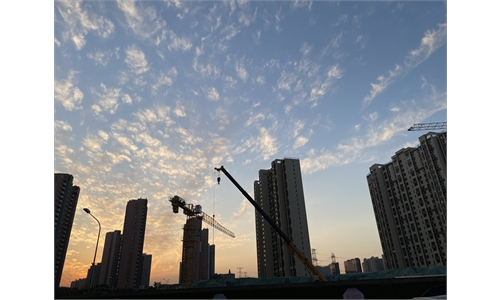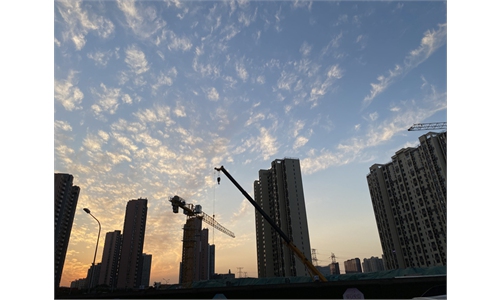
Vanke buildings in Jilin, Northeast China's Jilin Province, in June. Photo: CFP
Vanke, the country's second-largest property developer by sales, said on Thursday that it was confident in achieving stability and improving profitability in 2022, after reporting a sharp profit drop last year.
The remarks were made by Chairman Yu Liang during the company's 2021 earnings conference, where Yu apologized to investors for its 45.7 percent profit slump last year - only the third decline in the 31 years since its listing.
Vanke reported operating income of 452.8 billion yuan ($71.39 billion) in 2021, a year-on-year increase of 8 percent. Net profit was 22.52 billion yuan, only about half the year-earlier level of 41.5 billion yuan.
The decline was mainly due to lower gross profit margins in the development business, a drop in investment income and provisions for asset impairment losses, according to the firm.
Yu said Vanke has experienced only three net profit declines, which were in 1995, 2008 and 2021. Behind each decline, cumulative shortcomings were exposed. "When the external environment presents challenges, the shortcomings will be reflected in net profit," Yu said.
He noted that Vanke is confident of stabilizing and improving its situation this year. He revealed that starting from last year, the company abolished the rank of "group partner," in an effort to encourage everyone, including group executives, to "go to the front line and fight for a promising result."
"It's a positive and symbolic move, indicating the firm and perhaps the industry is making a management transformation to improve efficiency," Yan Yuejin, research director at Shanghai-based E-house China R&D Institute, told the Global Times on Thursday.
Vanke's profit decline came as the performance of most real estate companies in China declined significantly. Among the 64 A-share listed real estate companies, 27 reported losses, accounting for 42.2 percent, according to the China Index Research Institute.
The one that drew most attention was Evergrande. The company promised in mid-March that it would come up with a restructuring plan in about four months, as the embattled Chinese property giant offered a detailed explanation to its investors in China and abroad on how it plans to deal with its mounting debt.
The company's overseas liabilities currently amount to about $22.7 billion and it is organizing intermediary teams to further sort out relevant data, Xiao En, the company's executive director disclosed.
Yan noted that Vanke's case is different from that of Evergrande, even though both may face "the throes of transition" amid the country's deleveraging efforts. "Evergrande's problem mainly comes from its debt, while Vanke's debt situation remains comparatively safe."
Yu believes the industry will return to normalcy and rationality after adjustment, since too high or too low profit margins are unsustainable. The sector's income level will eventually return to the social average - a healthier industry is also where its confidence comes from.
He said the housing market will remain at least above 10 trillion yuan given China's vast population, and real estate will remain a significant business activity in the country and also Vanke's main business, now and the future.
Chinese authorities have been unveiling measures to stabilize the property market since the beginning of the year, including giving developers easier access to pre-sale funds held in escrow, requiring smaller down payments for first-time home buyers, and allowing commercial banks to lower mortgage rates.
Global Times


